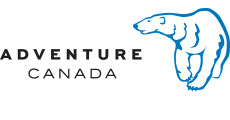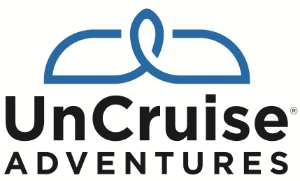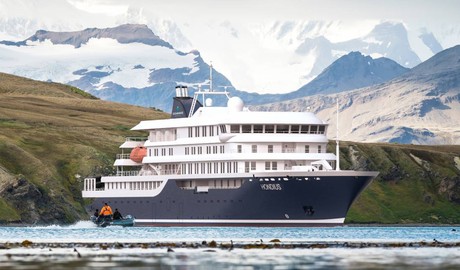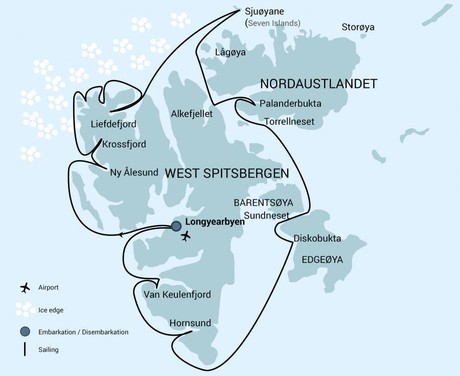Around Spitsbergen - In the Realm of Polar Bear & Ice Expedition
Take a cruise around Spitsbergen and explore the icy waters of the North Atlantic. This special expedition offers you the chance to catch site of whales, reindeer, Arctic foxes, walruses, seals, and the star attraction, the polar bear.
Highlights
• Bellsund
• Bird cliffs of Alkefjellet
• Brünnich's Guillemot
• Diskobukta
• Hornsund
• Kittiwake
• Monacobreen
• Polar Bear
• Sjuøyane
• Snowshoeing
• Walrus
• Zodiac Cruising & Shore program
You touch down in Longyearbyen, the administrative center of Spitsbergen, the largest island of the Svalbard archipelago. Enjoy strolling around this former mining town, whose parish church and Svalbard Museum make for fascinating attractions. Though the countryside appears stark, more than a hundred species of plant have been recorded in it. In the early evening the ship sails out of Isfjorden, where you might spot the first minke whale of your voyage.
Heading north along the west coast, you arrive by morning in Krossfjorden. Here you might board the Zodiacs for a cruise near the towering blue-white face of the Fourteenth of July Glacier. On the green slopes near the glacier, colorful flowers bloom while flocks of kittiwakes and Brünnich’s guillemots nest on the cliffs. You have a good chance of spotting an Arctic fox scouting for fallen chicks, or a bearded seal paddling through the fjord. In the afternoon you sail to Ny Ålesund, the northernmost settlement on Earth. Once a mining village served by the world’s most northerly railway – you can still see its tracks – Ny Ålesund is now a research center. Close to the community is a breeding ground for barnacle geese, pink-footed geese, and Arctic terns. And if you’re interested in the history of Arctic exploration, visit the anchoring mast used by polar explorers Amundsen and Nobile in their airships, Norge (1926) and Italia (1928).
Depending on the weather, you could sail into Liefdefjorden and cruise within sight of the 5-kilometer-long (3.1 miles) face of the precipitous Monaco Glacier. The waters in front of this glacier are a favorite feeding spot for thousands of kittiwakes, and the base of the ice is a popular polar bear hunting ground. If ice conditions prevent sailing here early in the season, an alternate route along the west coast of Spitsbergen can be implemented.
The northernmost point of your voyage may be north of Nordaustlandet, in the Seven Islands. Here you reach 80° north, just 870 km (540 miles) from the geographic North Pole. Polar bears inhabit this region, so the ship may park for several hours among the pack ice before wheeling around west again. When the edge of this sea ice is tens of miles north of the Seven Islands (mostly in August), you can spend a second day in this area. Alternatively (mostly in July) you may turn to Sorgfjord, where you have the chance to find a herd of walruses not far from the graves of 17th-century whalers. A nature walk here can bring you close to families of ptarmigans, and the opposite side of the fjord is also a beautiful area for an excursion.
Today you sail into Hinlopen Strait, home to bearded and ringed seals as well as polar bears. At the entrance there is even the possibility to spot blue whales. As with Liefdefjorden, you can take an alternate west Spitsbergen route if ice prevents entry into Hinlopen. After cruising among the ice floes of Lomfjordshalvøya in the Zodiacs, you then view the bird cliffs of Alkefjellet with their thousands of Brünnich’s guillemots. On the east side of Hinlopen Strait, you may attempt a landing where reindeer, pink-footed geese, and walruses are likely sights. Near Torrelneset you can also visit the polar desert of Nordaustlandet, next to the world’s third-largest ice cap. Here you may encounter walruses during a coastline hike over the area’s raised beaches.
The plan is to make landings in Freemansundet, though polar bears sometimes make this impossible. Potential stops on Barentsøya include Sundneset (for an old trapper’s hut), Kapp Waldburg (for its kittiwake colony), and Rindedalen (for a walk across the tundra). You might also cruise south to Diskobukta, though Kapp Lee is more likely your destination. On Kapp Lee is a walrus haul-out, Pomor ruins, and the chance for hikes along Edgeøya.
You start the day by cruising the side fjords of the Hornsund area of southern Spitsbergen, taking in the spire-like peaks: Hornsundtind rises 1,431 meters (4,695 feet), and Bautaen is a perfect illustration of why early Dutch explorers named this island Spitsbergen, meaning “pointed mountains.” There are 14 sizable glaciers in this area as well as opportunities for spotting seals, beluga whales, and polar bears.
Today you find yourself in Bell Sund, one of the largest fjord systems in Svalbard. The ocean currents make this area slightly warmer than other areas in the archipelago, which shows in the relatively lush vegetation. Here there are excellent opportunities to enjoy both history and wildlife. A possibility is Ahlstrandhalvøya, at the mouth of Van Keulenfjorden, where piles of beluga skeletons can be found. These remains of 19th-century whale slaughter are a haunting reminder of the consequences of rampant exploitation. Fortunately, belugas were not hunted into extinction, and you have a good chance of coming across a pod. Alternately, while cruising the side fjords of Bellsund, you can explore tundra where reindeer like to feed as well as rock slopes where little auks are breeding.
Every adventure, no matter how grand, must eventually come to an end. You disembark in Longyearbyen, taking home memories that will accompany you wherever your next adventure lies.
The chances that we can complete a full Spitsbergen circumnavigation (based on our experiences from 1992 – 2018) are about 30% in the first half of July, 70% in the second half, 90% in the first half of August, and 95% in the second half. In case we cannot complete a full circumnavigation, we may devise a program in northeast or southeast Spitsbergen. All itineraries are for guidance only. Programs may vary depending on ice, weather, and wildlife conditions. The onboard expedition leader determines the final itinerary. Flexibility is paramount for expedition cruises.
|
Book now |
Quadruple Porthole

Triple Porthole

Twin Porthole

Twin Window

Twin Deluxe

Superior

Junior Suite

Grand Suite with Private Balcony
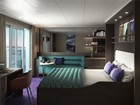
|
Book now |
Quadruple Porthole

Triple Porthole

Twin Porthole

Twin Window

Twin Deluxe

Superior

Junior Suite

Grand Suite with Private Balcony

|
Book now |
Quadruple Porthole

Triple Porthole

Twin Porthole

Twin Window

Twin Deluxe

Superior

|
Book now |
Quadruple Porthole

Triple Porthole

Twin Porthole

Twin Window

Twin Deluxe

Superior

|
Book now |
Quadruple Porthole

Triple Porthole

Twin Porthole

Twin Window

Twin Deluxe

Superior

Junior Suite

Grand Suite with Private Balcony

|
Book now |
Quadruple Porthole

Triple Porthole

Twin Porthole

Twin Window

Twin Deluxe

Superior

|
Book now |
Quadruple Porthole

Twin Porthole

Twin Window

Superior

Triple Porthole
Twin Deluxe
|
Book now |
Quadruple Porthole

Triple Porthole

Twin Porthole

Twin Window

Twin Deluxe

Superior

Junior Suite

Grand Suite with Private Balcony

|
Book now |
Quadruple Porthole

Triple Porthole

Twin Porthole

Twin Window

Twin Deluxe

Superior

|
Book now |
Quadruple Porthole

Twin Porthole

Triple Porthole
Twin Window
Twin Deluxe
Superior
|
Book now |
Quadruple Porthole

Triple Porthole

Twin Porthole

Twin Window

Twin Deluxe

Superior

Junior Suite

Grand Suite with Private Balcony

|
Book now |
Quadruple Porthole

Triple Porthole

Twin Porthole

Twin Window

Twin Deluxe

Superior

|
Book now |
Quadruple Porthole

Triple Porthole

Twin Porthole

Twin Window

Twin Deluxe

Superior

Junior Suite

Grand Suite with Private Balcony

Includes Kvitoya Island Visit
|
Book now |
Quadruple Porthole

Triple Porthole

Twin Porthole

Twin Window

Twin Deluxe

Superior

Junior Suite

Grand Suite with Private Balcony

Includes Kvitoya Island Visit
|
Book now |
Quadruple Porthole

Triple Porthole

Twin Porthole

Twin Window

Twin Deluxe

Superior

|
Book now |
Quadruple Porthole

Triple Porthole

Twin Porthole

Twin Window

Twin Deluxe

Superior

Junior Suite

Grand Suite with Private Balcony

Includes Kvitoya Island Visit
|
Book now |
Quadruple Porthole

Triple Porthole

Twin Porthole

Twin Window

Twin Deluxe

Superior

|
Book now |
Quadruple Porthole

Triple Porthole

Twin Porthole

Twin Window

Twin Deluxe

Superior

|
Book now |
Quadruple Porthole

Triple Porthole

Twin Porthole

Twin Window

Twin Deluxe

Superior

Junior Suite

Grand Suite with Private Balcony

Includes Kvitoya Island Visit
|
Book now |
Quadruple Porthole

Triple Porthole

Twin Porthole

Twin Window

Twin Deluxe

Superior

|
Book now |
Quadruple Porthole

Triple Porthole

Twin Porthole

Twin Window

Twin Deluxe

Superior

|
Book now |
Quadruple Porthole

Triple Porthole

Twin Porthole

Twin Window

Twin Deluxe

Superior

Vessel Type: Polar Class Expedition Ship
Length: 107.6 metres
Passenger Capacity: 170
Built: 2019
Hondius is the first-registered Polar Class 6 vessel in the world, meeting the latest and highest Lloyd’s Register demands for ice-strengthened cruise vessels. Hondius also exceeds the requirements of the Polar Code as adopted by the International Maritime Organization (IMO), allowing you to enjoy the polar regions as much as possible while impacting them as little as possible. Upon completion, Hondius will be the most flexible, advanced, innovative ice-strengthened vessel in the polar regions. It is optimized for exploratory voyages that provide you the utmost first-hand contact with the Arctic and Antarctica.
Hondius offers high-quality accommodation for 170 passengers in six grand suites with balconies (27 square meters, 291 square feet), eight junior suites (19 to 20 square meters, 205 to 215 square feet), eight superior cabins (20 to 21 square meters, 215 to 226 square feet), 11 twin deluxe cabins, (19 to 21 square meters, 205 to 226 square feet), 14 twin window cabins (12 to 14 square meters, 129 to 151 square feet) as well as 28 twin porthole cabins, two triple porthole cabins, and four quadruple porthole cabins that vary in size from 12 to 18 square meters, or 129 to 194 square feet. The passenger capacity certificate for Hondius is 196 persons. One deck consists of a large observation lounge and separate lecture room, which are reserved for a wide variety of interactive workshops, exhibitions, and performances particular to Hondius. Though elegantly designed in stylish mid-century modern décor, this vessel holds true to Oceanwide’s distinctive cozy and informal atmosphere.
It is our philosophy to keep sea time short so that we can focus instead on fast, effective access to shore and near-shore activities. To give you the maximum contact with the nature and wildlife you traveled so far to see, we employ a tough fleet of rigid-hull inflatable Zodiac boats that guarantee swift and safe landing operations for the passengers. Hondius has two separate gangways and a sheltered indoor Zodiac embarkation platform that can also be used for special outdoor activities, such as kayaking.
Our top priority is taking advantage of every wildlife and terrain opportunity as it occurs. To keep our itineraries flexible itineraries and our response time rapid, Hondius is equipped with advanced stabilizers and two main engines capable of powering the vessel up to 15 knots. But Hondius sacrifices no warmth to achieve its keen polar edge: You will have 72 crew and staff members (including expedition and hotel staff) at your service while on board, ensuring that what little time you do spend on the ship you will spend comfortably entertained.


Vessel Type: Expediton
Length: 91m
Passenger Capacity: 108-123
Built / Refurbished : 1989 / 2015
The vessel has the highest ice-class notation (UL1, equivalent to 1A) and is therefor suitable to navigate in solid one-year sea ice as well as loose multi-year pack ice. Ortelius can accommodate up to 116-123 passengers (108 passengers as of season Arctic 2020) and has an abundance of open-deck spaces. It is manned by 22 highly experienced nautical crew members, 19 hotel staff, eight expedition specialists (one expedition leader, one assistant, and six lecturer-guides), and one doctor.
Though our voyages are primarily meant to offer our passengers an exploratory wildlife program with as much time ashore as possible, Ortelius offers all the comforts of a standard hotel ― along with a bar and lecture room. Flexibility assures maximum wildlife opportunities. As such, Ortelius carries 10 Zodiacs with 60hp Yamaha engines.


Vessel Type: Expedition
Length: 89 metres
Passenger Capacity: 108 - 116
Built / refurbished: 1976 / 2009
M/v “Plancius” accommodates 116 passengers in 53 passenger cabins (108 passengers as of season Arctic 2020) with private toilet and shower in 4 quadruple porthole cabins, 2 triple porthole cabins, 9 twin porthole cabins, 26 twin cabins with window and 2 twin deluxe cabins, all (ca. 12,5 square meters) and 10 twin superior cabins (ca. 21 square meters). All cabins offer lower berths (one queen-size bed in the superior cabins and two single beds in the twin cabins), except for the 4 quadruple cabins (for 4 persons in 2x upper and lower beds), and 2 triple cabins (1 bunk bed plus 1 lower bed).
The vessel offers a restaurant/lecture room on deck 3 and a spacious observation lounge (with bar) on deck 5 with large windows, offering full panorama view. M/v “Plancius” has large open deck spaces (with full walk-around possibilities on deck 4), giving excellent opportunities to enjoy the scenery and wildlife. She is furthermore equipped with 10 Mark V zodiacs, including 40 HP 4-stroke outboard engines and 2 gangways on the starboard side, guaranteeing a swift zodiac operation. M/v “Plancius” is comfortable and nicely decorated, but is not a luxury vessel. Our voyages in the Arctic and Antarctic regions are primarily defined by an exploratory educational travel programme, spending as much time ashore as possible. Plancius fully meets our demands to achieve this. The vessel is equipped with a diesel-electric propulsion system which reduces the noise and vibration of the vessel considerably. The 3 diesel engines generate 1.230 horse-power each, giving the vessel a speed of 10 - 12 knots. The vessel is ice-strengthened and was specially built for oceanographic voyages. M/v “Plancius” is manned by an international crew of 37 (18 nautical crew and 19 hotel crew), 8 expedition staff (1 expedition leader, 1 assistant expedition leader and 6 guides/lecturers), and 1 doctor.


Inclusions
• Voyage in selected accommodation category
• All meals while on board the ship
• Coffee and Tea while on board
• All shore excursions and landings by zodiac as per the itinerary
• Lectures held on board by Expedition Team and natuarlists
• Port Charges/Taxes
• Comprehensive Pre-departure materials
• Transfers and baggage handling between the airport, hotels and ship only for those passengers on the group flights to and from Longyearbyen.
Exclusions
• International and domestic airfares whether commercial or charter
• Pre and Post-voyage accommodation
• Passport and visa costs if applicable
• Travel insurance including medical evacuation cover
• Beverages not listed in inclusions
• Any items of a personal nature including any medical costs incurred on board
• Meals when not on board the ship
• Gratuities (Recommended USD$15 per passenger per day)
Our Associates Include
